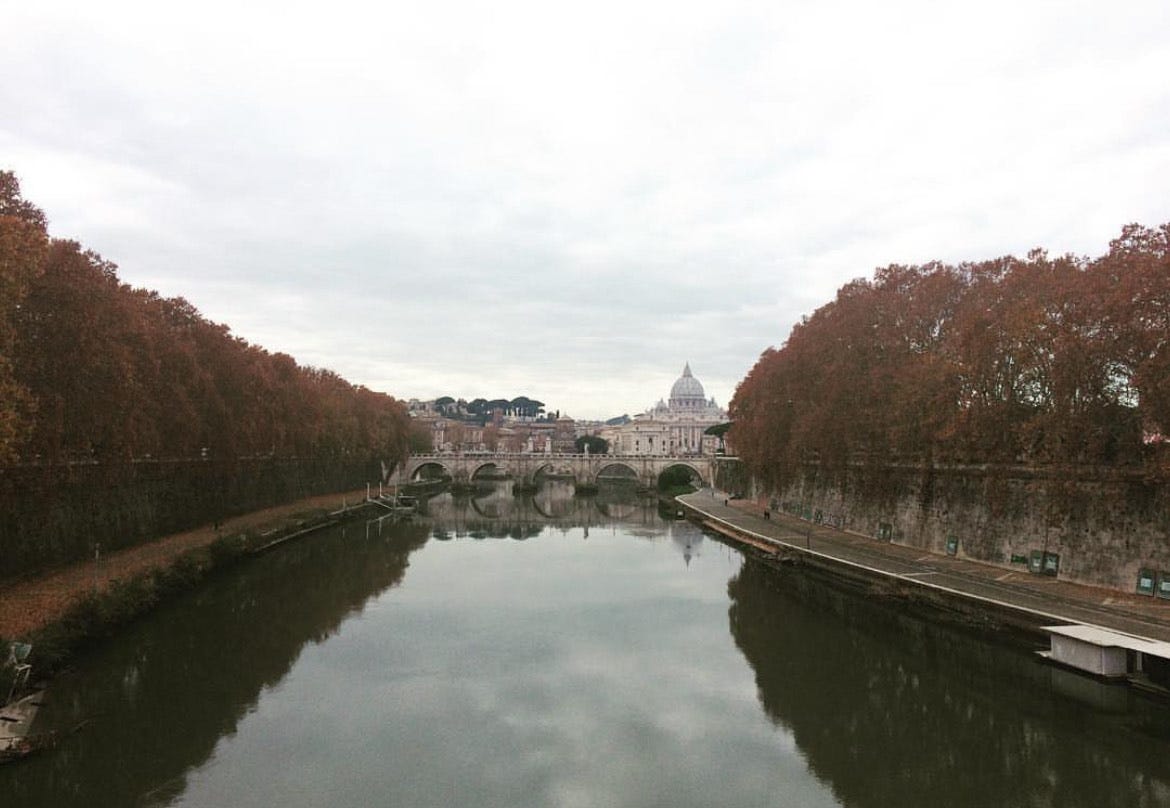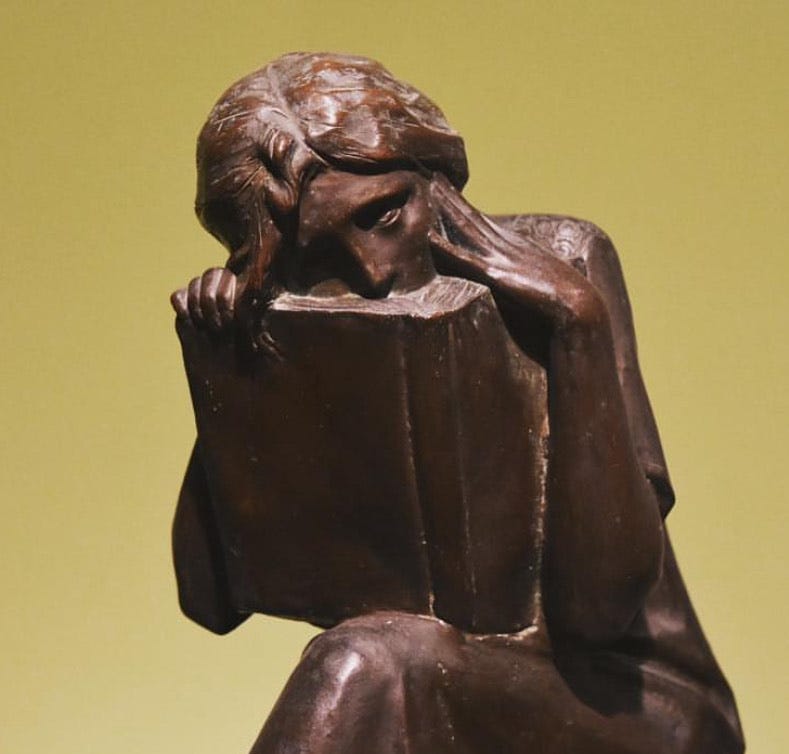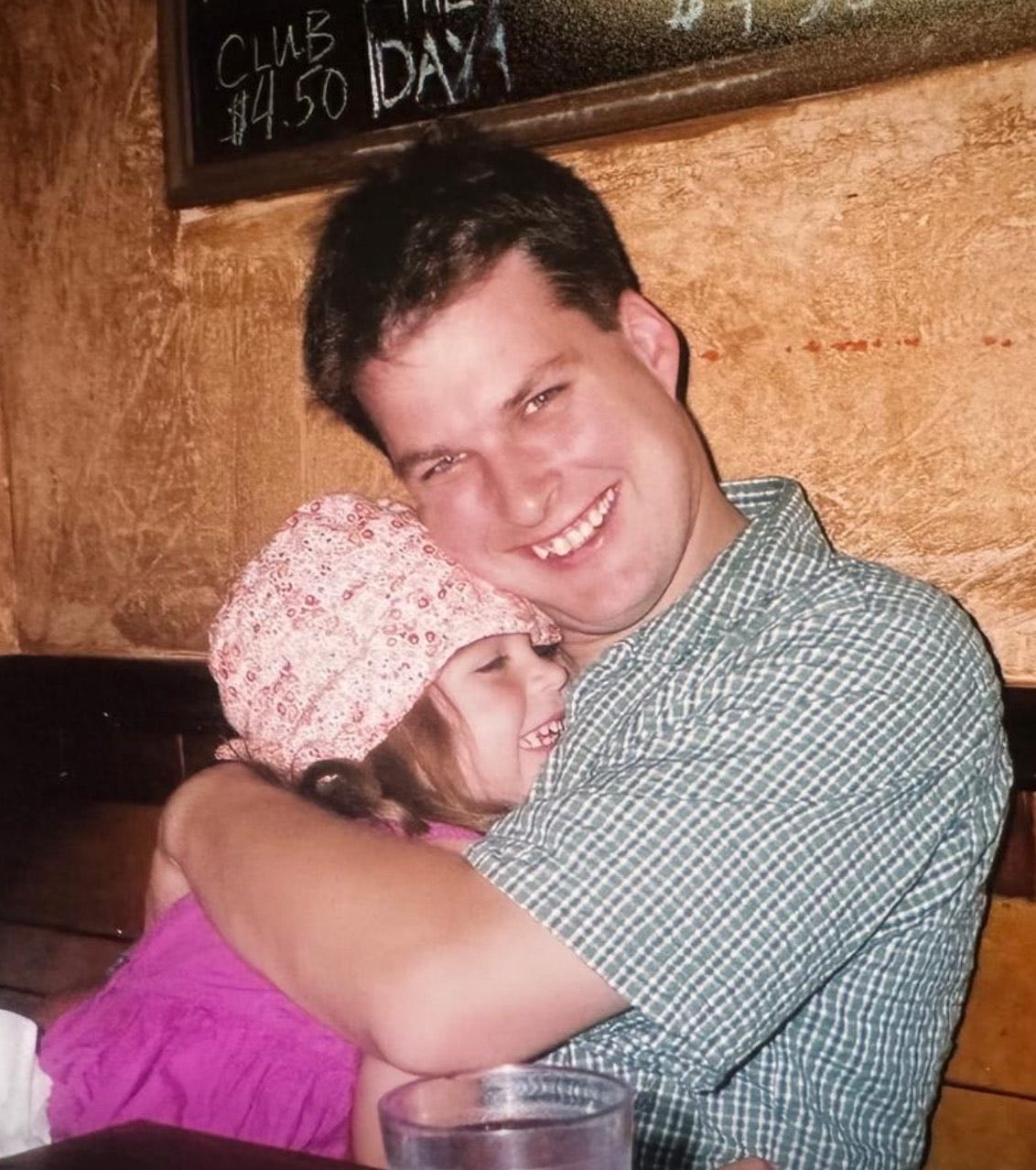I’m perpetually six years too late to any meaningful trend, so this is when I’m starting this Substack. It’s for my essays and little bits and pieces that don’t go anywhere; on writing, publishing, etc. Please subscribe so I can ‘build my brand’ as people keep telling me to <3
Rome was the first place I was ever really alone. I visited when I was barely nineteen, in early December. I was living in Barcelona at the time, and during the days I worked at an international school, while in the afternoons I would babysit the demonic children of the families I was living with. More than once a father put their hand up my skirt, and a mother blamed me, but I got over it. Every month I was paid €300, which was a fortune to me. I did all the things that nineteen-year-olds are supposed to do: make friends, get drunk and high in a stranger’s living room, fall in love.
Nineteen. I remember the vivid bloody shake of leaves over the grey Tiber. How could it be, I thought, that a place was so old? Everywhere I’d lived thus far — Perth, Toronto, Pietermaritzburg — had (in their current incarnations) only existed for a couple of centuries at most. And now I was standing on the corner of a street that people had been walking down for thousands of years. That was the thing that amazed me the most, I think: everyone moving around the city like ghosts of themselves, climbing in and around ancient history. You could go and get McDonald’s right next to a piazza from 1493.
For five days I slept in a single-bed hotel room, and was so poor I ate only bread rolls and shaved ham. I walked everywhere — to the Vatican and back again, though I didn’t go in. I visited bookshops and tiny museums, taking photos with an old digital camera I’d gotten for my birthday. It rained incessantly. I was so cold. I got stalked by one man, and kissed by another, much older one, who slipped his tongue in my mouth after he gave me a private tour of an interior furnishing museum. This disgusted me — then it delighted me.
I sent the photos to the person I was in love with, back in Barcelona, who ignored me. We had a strange, intense relationship that seemed predicated on notions of power and psychosexual manipulation that I still cannot make sense of. A few months later, he would leave me alone in the city with a dead phone and his house keys at three in the morning, and tell me to find my way back to his apartment by myself. I still find it very difficult to talk about what happened that night, so I won’t, but you can probably guess.
The next time I went to Rome I was twenty-one, and it was January. I was struggling with eating, almost to the point of needing serious help, and my hair was thinner. My body felt old, even though I knew I was young. At an all-female hostel, flowers were delivered every morning, and pads and tampons were set out carefully in the bathroom. I felt relieved; safe. I met a beautiful girl from Chile and we walked all over the city together. She wanted to be a doctor, and told me stories of treating patients from the political riots. A friend had lost an eye, she said. Her backpack was bigger than she was. I wanted to kiss her a little bit, but I didn’t.
We ate gelato and tossed coins in the Trevi fountain, which you could still do at that point. I can’t remember now what I wished for — a different life, maybe. It was January of 2020, and I was staring down the barrel of another year failing out of university classes, bumming around Perth with my feral friends, consuming drugs of questionable origin at backyard parties. I had a shitty boyfriend who practiced shooting his crossbow in the garden of his crumbling portside bungalow, and grew magic mushrooms by the fence. I rationalised this relationship by telling myself at least he was kind, but looking back I just think he wasn’t actively sadistic. It is impossible to describe the depth of my apathy (I will always think of depression as a beach where the sand is too hot to walk on) but I was going nowhere fast. I didn’t know that a handful of months later, I would be on the plane to London, on my way to that fabled, new existence that I had wished for.
Now I am twenty-six years old, and still in Rome. I’ve gained weight; my hair has grown back. I am in another relationship. I have a full-time job, and a beautiful apartment. I am writing a novel. Yet the river looks the same; the buildings are unchanged. If I feel any momentous shift, it has taken place within me, rather than my environment. There are small things missing, though. Little glitches in my universe. The women’s hostel is shut down, permanently. I looked for that Chilean girl on Instagram and her account was deactivated, so our message history was gone. I can’t find her anywhere. I have lost friends, and moved continents, and people in my family have died. Things pass into memory and remain there, and I keep going — the gulf between us becomes insurmountable. You can stretch a hand out towards them, but you’ll never have them again.
One of my favourite songs is by an old friend who hasn’t released music in years. I have to listen to it on Youtube, because the only recording that exists is a fuzzy, shaky video of her singing it alone in a crowded pub. Another is by Jack, and lives only on Soundcloud. I think about his wry little smile, and how impressive it was to channel that kind of wise wistfulness at nineteen years old. There’s this line he wrote about going to the bathroom and being sold ecstasy, and when he returns back to the table, he realises that something unnameable has changed within himself, and he can never see any of the people he’s with there again. I can listen to his voice, but I can’t go back to his garden, with that huge cactus plant and corrugated tin roof. Time is a thief in the same way that museums are thieves; all the artefacts of your past displayed like that. These songs become archival objects, divorced from context, something to go back to when I am homesick.
I am always homesick.
This morning, my father sent me a collection of old photos, and the first chapters of a campus novel he’d started when he was only a little older than me. It’s about a group of friends in Pietermaritzburg, on the eve of Mandela’s presidency. Heliopause, he called it. I looked it up: the theoretical boundary where the Sun's solar wind is stopped by the interstellar medium. I like that. My own book still doesn’t have a title, or an epigraph, but I was struck so much by the poem that my father had chosen for his own:
I have opened a door into a new life,
what were the countries I left behind,
a life I thought I was familiar with
Isn’t that so strange? I guess we must have been feeling the exact same thing, decades apart. It bleeds through to me, his pain, his love. I’m his conduit. He inspires so much of my writing, because I think he’s a truly good person with scrupulous politics, and because he’s been through so much in his life and is still resolutely kind. He taught me that maintaining a fair moral compass and leaving other people better than I found them — more than any ambition or professional accomplishment — would be the best mark of whether I was living well. I hope, by and large, that I'm following his example.
I miss him a lot, my father, and also my beautiful, wonderful mother, who is still recovering from breast cancer. I miss Jacob as I knew him, years ago, when he lived in my phone and my email inbox. I miss Theo. I miss Anne. I miss my ex before my ex, who was a terrible person but always seemed to know the right poem to reference, and listened dutifully to every song I sent him. I miss people I barely know.
Most of all, I miss those photos from when I was nineteen and in Rome for the very first time. A few I’ve put in this post, but the rest I have misplaced. What happened to them? A hard-drive, maybe, lost in my sock drawer. What happened to the girl who took them? Seven years later, I’m here again, walking the same streets, looking over my shoulder for that person I was once. She was so in love; she was trembling with the future. I wish I could catch her by her shoulders and whisper something in her ear. Things will get worse, I would say. Worse than you ever thought possible. And then they will get better.
Bits and pieces
I’m reading Flesh by David Szalay, which I like very much — he pulls off affectless prose so well, and imbues the flatness with such feeling. Spare, sad, brilliant.
I’m listening to the new Angie McMahon and Leif Vollebekk single, released today, which has already made me cry a bit. And I Am A Woman got me through some very dicey times. Thank you Angie.
I’m watching The Beach by Warwick Thornton — an almost unbearably beautiful documentary series filmed on a remote beach in my home state of Western Australia. Thornton is one of my favourite directors. It’s a pleasure to watch him navigate solitude, and to watch those familiar shockingly blue skies.









Beautifully written, and tender. It brought back memories of my own travels through Rome and all the people that have come and gone over the years.
Loved this, I brought a tear to my eye. Made me think of lost friends and family sitting here watching the sun come up. This is why I love Substack, through all the political bollocks true gems.
Also loved the dog piece. It reminded me of my somewhat failed attempt at cat fostering.
Keep them coming